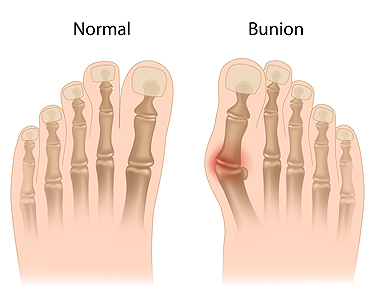 Bunions are a joint misalignment that occur as bony bumps at the base of the big toe, and they can be extremely painful. Bunions tend to form over time and cause the big toe to bend towards the other toes. Bunions can be caused by pressure on the forefoot, wearing poorly fitted shoes, including high heels, or trauma to the foot. Biomechanical factors such as overpronation of the foot can also lead to bunions. Treating a bunion will involve reducing pain and correcting any biomechanical issues. While orthotics are often recommended, surgery may be needed for more severe cases. If you are suffering from a bunion, consult with a podiatrist for proper treatment.
Bunions are a joint misalignment that occur as bony bumps at the base of the big toe, and they can be extremely painful. Bunions tend to form over time and cause the big toe to bend towards the other toes. Bunions can be caused by pressure on the forefoot, wearing poorly fitted shoes, including high heels, or trauma to the foot. Biomechanical factors such as overpronation of the foot can also lead to bunions. Treating a bunion will involve reducing pain and correcting any biomechanical issues. While orthotics are often recommended, surgery may be needed for more severe cases. If you are suffering from a bunion, consult with a podiatrist for proper treatment.
If you are suffering from bunion pain, contact one of our podiatrists of Advanced Ankle & Foot Surgeons. Our doctors can provide the care you need to keep you pain-free and on your feet.
What Is a Bunion?
Bunions are painful bony bumps that usually develop on the inside of the foot at the joint of the big toe. As the deformity increases over time, it may become painful to walk and wear shoes. Women are more likely to exacerbate existing bunions since they often wear tight, narrow shoes that shift their toes together. Bunion pain can be relieved by wearing wider shoes with enough room for the toes.
Causes
- Genetics – some people inherit feet that are more prone to bunion development
- Inflammatory Conditions - rheumatoid arthritis and polio may cause bunion development
Symptoms
- Redness and inflammation
- Pain and tenderness
- Callus or corns on the bump
- Restricted motion in the big toe
In order to diagnose your bunion, your podiatrist may ask about your medical history, symptoms, and general health. Your doctor might also order an x-ray to take a closer look at your feet. Nonsurgical treatment options include orthotics, padding, icing, changes in footwear, and medication. If nonsurgical treatments don’t alleviate your bunion pain, surgery may be necessary.
If you have any questions, please feel free to contact our office located in O'Fallon, and New Baden, IL . We offer the newest diagnostic and treatment technologies for all your foot care needs.
